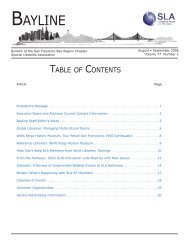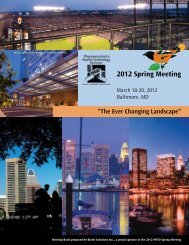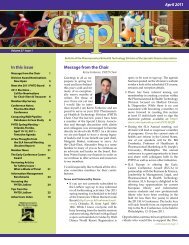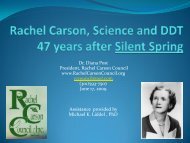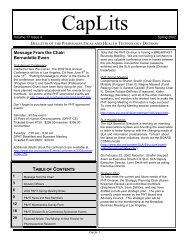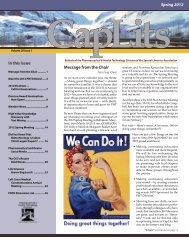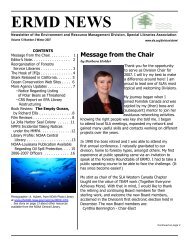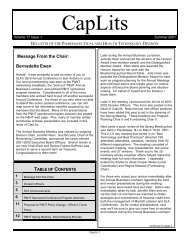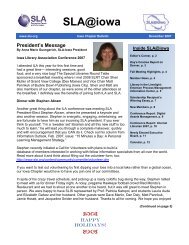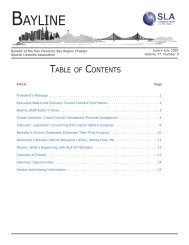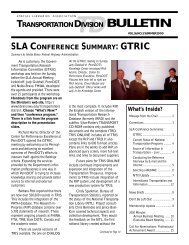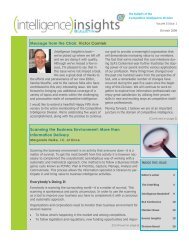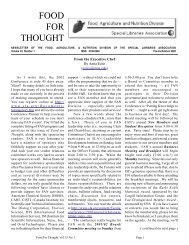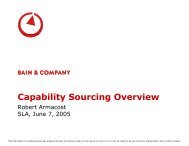Education Libraries - Special Libraries Association
Education Libraries - Special Libraries Association
Education Libraries - Special Libraries Association
Create successful ePaper yourself
Turn your PDF publications into a flip-book with our unique Google optimized e-Paper software.
Librarians as<br />
Learning<br />
<strong>Special</strong>ists: Meeting<br />
the Learning<br />
Imperative for the<br />
21 st Century—<br />
Reviewed by Erin<br />
Fields<br />
Zmuda, A., &<br />
Harada, V.H. (2008).<br />
Librarians as<br />
Learning<br />
<strong>Special</strong>ists: Meeting<br />
the Learning<br />
Imperative for the<br />
21 st Century.<br />
Connecticut:<br />
<strong>Libraries</strong> Unlimited.<br />
ISBN 978-1-5915-<br />
8679-1. $40.00.<br />
In Librarians as Learning <strong>Special</strong>ists: Meeting the<br />
Learning Imperative for the 21 st Century, Zmuda and<br />
Harada outline the role of learning specialists in<br />
providing opportunities and objectives for student<br />
learning that can be systematically assessed. Zmuda and<br />
Harada have written a book for administrators and<br />
learning specialists that deal with the central themes of<br />
accountability, leadership, collaboration, and reflection<br />
to create a learning environment that is based on results.<br />
The authors identify areas where these themes should be<br />
addressed in the school environment and reorient the<br />
role of the learning specialist (with special focus on the<br />
library media specialist) as a key figure in achieving<br />
these goals.<br />
The book’s format provides ease of use for quick<br />
reference. Each chapter outlines a way in which learning<br />
specialists can be oriented to play a more central role in<br />
the “results-oriented” learning successes of their students<br />
and colleagues. Each chapter is broken into four parts<br />
which focus on: the theoretical background to the<br />
chapters’ content with an analysis of core literature;<br />
issues that administrators and staff must overcome to<br />
achieve the goals outlined; an analysis of the challenges<br />
learning specialists will face; and a framework for the<br />
role of the library media specialists. The authors also<br />
provide additional readings and exercises that connect<br />
directly to the core content of the chapter to bridge the<br />
gap between theory and practice. A comprehensive list<br />
of references at the end of each chapter and an index at<br />
the end of the book, make this a highly usable and<br />
accessible resource.<br />
In chapter 1, Closing the Learning Gap: Reframing Our<br />
Mission, Zmuda and Harada describe the importance of<br />
having a mission statement with defined learning<br />
principles that “describe the necessary components of<br />
the learning environment” (3). At the center of these<br />
principles, according to Zmuda and Harada, are<br />
reflection, collaboration, and assessment that stems from<br />
the learning specialists leadership role.<br />
Zmuda and Harada clarify the role of the library media<br />
specialist in the education environment while making<br />
explicit the need to develop a clear job description that<br />
identifies the specialist as a leader that affects change on<br />
student achievement and collegial developments. Zmuda<br />
and Harada outline the expertise required of all learning<br />
specialists (i.e. collaboration, content and pedagogical<br />
expertise, reflection and adaptability) while focusing on<br />
the need for library media specialists to create<br />
opportunities to align the learning goals of the library<br />
curriculum with that of the classroom curriculum<br />
(Chapter 2, The Learning <strong>Special</strong>ist: Clarifying the Role<br />
of the Library Media <strong>Special</strong>ists).<br />
In Chapter 3, Designing Instruction to Fit the Nature of<br />
the Learning and the Learner, Zmuda and Harada focus<br />
on learner centered instructional design and how<br />
learning specialists need to have not only a commitment<br />
to and knowledge of their areas of specialty, but also a<br />
connection to the students as their “coaches of learning”<br />
(49). Although Zmuda and Harada highlight the<br />
challenges to learner centered instruction, they focus the<br />
chapter on the collaborative process between classroom<br />
teachers and library media specialists that can assist in<br />
the design and application of learner centered<br />
instruction. They also provide scenarios from elementary<br />
through high school where the learning experience was<br />
personalized and the process was supported through<br />
collaboration. Of particular interest was the discussion<br />
on diversity in the classroom. Zmuda and Harada<br />
provide insight into this issue by addressing the<br />
challenges educators face in working with children from<br />
a variety of backgrounds and the ways that classroom<br />
teachers and library media specialists can support<br />
diverse learners. However, this section could have been<br />
expanded into a broader discussion of library media<br />
specialists’ role in design instruction for culturally<br />
diverse learners rather than focusing primarily on special<br />
needs students (e.g. ELL, LD, physically disabled).<br />
Although assessment is a central theme throughout the<br />
book, Chapter 4, Providing Robust Assessment and<br />
<strong>Education</strong> <strong>Libraries</strong>, Volume 31, No. 2, Winter 2008 62



